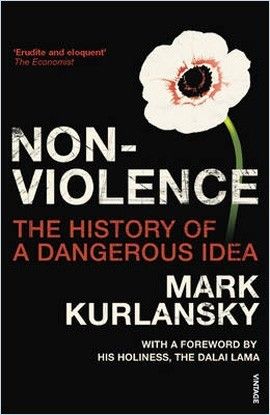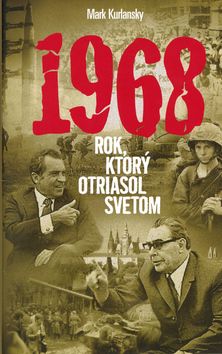Mark Kurlansky
autor
Nonviolence
The conventional history of nations, even continents, is a history of warfare. According to this view, all the important ideas and significant changes of humankind occurred as part of an effort to win one violent, bloody conflict or another. This approach to history is only one of many examples of how societies promote warfare and glorify violence. But there have always been a few who have refused to fight. Governments have long regarded this minority as a danger to society and have imprisoned and abused them and encouraged their persecution. This was true of those who refused Europe's wars, who refused to fight for their king, who refused to fight for Napoleon as well as against him. It was true of Virginia Woolf's sister Vanessa and her husband Clive Bell - outcasts in rural Sussex because they opposed World War I at a time when the British socialist movement described a bayonet as a weapon with a worker on each end. It was true of the first American draft dodger, a Menonite who believed in American independence but believed it was wrong to use violence and rejected the call of his local militia. It was true of the many abolitionists who had dedicated their lives to stopping slavery but refused to fight in the Civil War. Judaism, Islam, Christianity, Hinduism, Buddhism and, most impressively, the Menonites and the Quakers - all have passages in their major teachings rejecting warfare as immoral. In this brilliant exploration of pacifism, these points of view are discussed alongside such diverse non-violence theorists as Tolstoy, Shelley, Gandhi, Martin Luther King, Aldous Huxley, Erasmus, Confucius and Lao Tse to show how many modern ideas - such as a united Europe, the United Nations, and the abolition of slavery - originated in such non-violence movements.
Vypredané
9,42 €
9,92 €
1968 Rok, ktorý otriasol svetom
Kniha Marka Kurlanskeho prináša zaujímavý a netradičný pohľad na dianie v roku 1968, v roku, ktorý považuje autor za jedinečný vďaka spontánnemu duchu rebélie a protestu rozšírenému po celom svete. Autor v chronologickej postupnosti od januára do decembra postupne prechádza dôležité udalosti roku 1968 a usiluje sa o analýzu niektorých z nich (napr. Pražská jar, vojenský konflikt v Biafre, hnutie za práva černošského obyvateľstva v USA).
Vypredané
16,10 €
16,95 €
Milk!
Mark Kurlansky's first global food history since the bestselling Cod and Salt; the fascinating cultural, economic, and culinary story of milk and all things dairy--with recipes throughout.
According to the Greek creation myth, we are so much spilt milk; a splatter of the goddess Hera's breast milk became our galaxy, the Milky Way. But while mother's milk may be the essence of nourishment, it is the milk of other mammals that humans have cultivated ever since the domestication of animals more than 10,000 years ago, originally as a source of cheese, yogurt, kefir, and all manner of edible innovations that rendered lactose digestible, and then, when genetic mutation made some of us lactose-tolerant, milk itself.
Before the industrial revolution, it was common for families to keep dairy cows and produce their own milk. But during the nineteenth century mass production and urbanization made milk safety a leading issue of the day, with milk-borne illnesses a common cause of death. Pasteurization slowly became a legislative matter. And today milk is a test case in the most pressing issues in food politics, from industrial farming and animal rights to GMOs, the locavore movement, and advocates for raw milk, who controversially reject pasteurization.
Profoundly intertwined with human civilization, milk has a compelling and a surprisingly global story to tell, and historian Mark Kurlansky is the perfect person to tell it. Tracing the liquid's diverse history from antiquity to the present, he details its curious and crucial role in cultural evolution, religion, nutrition, politics, and economics.
Vypredané
21,38 €
22,50 €
Lacná kniha Nonviolence (-90%)
The conventional history of nations, even continents, is a history of warfare. According to this view, all the important ideas and significant changes of humankind occurred as part of an effort to win one violent, bloody conflict or another. This approach to history is only one of many examples of how societies promote warfare and glorify violence. But there have always been a few who have refused to fight. Governments have long regarded this minority as a danger to society and have imprisoned and abused them and encouraged their persecution. This was true of those who refused Europe's wars, who refused to fight for their king, who refused to fight for Napoleon as well as against him. It was true of Virginia Woolf's sister Vanessa and her husband Clive Bell - outcasts in rural Sussex because they opposed World War I at a time when the British socialist movement described a bayonet as a weapon with a worker on each end. It was true of the first American draft dodger, a Menonite who believed in American independence but believed it was wrong to use violence and rejected the call of his local militia. It was true of the many abolitionists who had dedicated their lives to stopping slavery but refused to fight in the Civil War. Judaism, Islam, Christianity, Hinduism, Buddhism and, most impressively, the Menonites and the Quakers - all have passages in their major teachings rejecting warfare as immoral. In this brilliant exploration of pacifism, these points of view are discussed alongside such diverse non-violence theorists as Tolstoy, Shelley, Gandhi, Martin Luther King, Aldous Huxley, Erasmus, Confucius and Lao Tse to show how many modern ideas - such as a united Europe, the United Nations, and the abolition of slavery - originated in such non-violence movements.
Vypredané
0,99 €
9,92 €
dostupné aj ako:
Lacná kniha 1968 Rok, ktorý otriasol svetom (-95%)
Kniha Marka Kurlanskeho prináša zaujímavý a netradičný pohľad na dianie v roku 1968, v roku, ktorý považuje autor za jedinečný vďaka spontánnemu duchu rebélie a protestu rozšírenému po celom svete. Autor v chronologickej postupnosti od januára do decembra postupne prechádza dôležité udalosti roku 1968 a usiluje sa o analýzu niektorých z nich (napr. Pražská jar, vojenský konflikt v Biafre, hnutie za práva černošského obyvateľstva v USA).
Vypredané
0,85 €
16,95 €
dostupné aj ako:
The Core of an Onion
From the New York Times-bestselling author of Cod and Salt, a delectable look at the cultural, historical, and gastronomical layers of one of the world's most beloved culinary staples-featuring original illustrations and recipes from around the world.
As Julia Child once said, “It is hard to imagine a civilization without onions.”
Historically, she's been right-and not just in the kitchen. Flourishing in just about every climate and culture around the world, onions have provided the essential basis not only for sautés, stews, and sauces, but for medicines, metaphors, and folklore. Now they're Kurlansky's most flavorful infatuation yet as he sets out to explore how and why the crop reigns from Italy to India and everywhere in between.
Featuring historical images and his own pen-and-ink drawings, Kurlansky begins with the science and history of the only sulfuric acid–spewing plant, then digs through its twenty varieties and the cultures built around them. Entering the kitchen, Kurlansky celebrates the raw, roasted, creamed, marinated, and pickled. Including a recipe section featuring more than one hundred dishes from around the world, The Core of an Onion shares the secrets to celebrated Parisian chef Alain Senderens's onion soup eaten to cure late-night drunkenness; Hemingway's raw onion and peanut butter sandwich; and the Gibson, a debonair gin martini garnished with a pickled onion.
Just as the scent of sautéed onions will lure anyone to the kitchen, The Core of an Onion is sure to draw readers into their savory stories at first taste.
Vypredané
22,33 €
23,50 €










